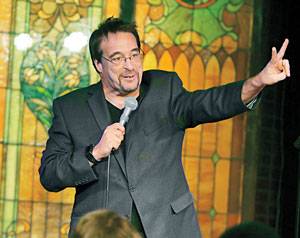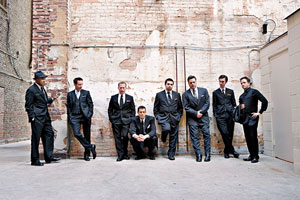Your sense of humor is an essential skill for getting through life.
What do you get when you put an introverted mechanical engineering student on a stage telling jokes in front of 150 people for 10 minutes? For Nick Seymour, a senior at Iowa State University, it was sheer perspiration-infused terror.
“Being on stage was one of my biggest fears,” says Nick, whose worst subject in high school was speech class. “I am this boring guy who sits in the corner and works on math.” So how did that guy find himself here, microphone in hand, sweating it out in front of a huge crowd?
 Nick’s performance was the final in his honors Comedy College course taught by professional comedian and instructor Gavin Jerome along with ISU economics professor Peter Orazem. Nick signed up for the class to work on his interpersonal skills. Throughout the semester, Nick and other fellow future engineers, mathematicians, psychologists and business leaders learned how to craft and write jokes, bounce ideas off each other, work the crowd and, at the end of the course, showcased their efforts in front of a live audience.
Nick’s performance was the final in his honors Comedy College course taught by professional comedian and instructor Gavin Jerome along with ISU economics professor Peter Orazem. Nick signed up for the class to work on his interpersonal skills. Throughout the semester, Nick and other fellow future engineers, mathematicians, psychologists and business leaders learned how to craft and write jokes, bounce ideas off each other, work the crowd and, at the end of the course, showcased their efforts in front of a live audience.“If you want to work in a team environment and get along with your co-workers, then a sense of humor and comedy training make you more likable and able to create rapport, reduce tension, facilitate communication and increase cooperation,” Gavin says.
The World Is a Stage
If we are shy turtles, humor can coax us out of our shells. If we are trying to break the ice with others, making people laugh can relieve stress and make awkward situations less so. Laughter and humor are ways to strengthen our bonds socially, improve relationships, lower stress and let down our negativity guards to say, “OK, this is a safe space.”
Psychologist Brian King, Ph.D., author of the book The Laughing Cure: Emotional and Physical Healing—A Comedian Reveals Why Laughter Is the Best Medicine, says when someone is laughing with you, your brain signals that this person is most likely not out to harm you.
 “So many people fear public speaking more than anything else,” he says. And when we have success and the audience is engaging, we are overcoming a tremendous amount of anxiety and that can be thrilling. Brian should know, because although he has been a professor and is no stranger to public speaking, he is also a working comedian who still gets nervous when performing. He knows just what kind of pressure Nick is dealing with up on that stage.
“So many people fear public speaking more than anything else,” he says. And when we have success and the audience is engaging, we are overcoming a tremendous amount of anxiety and that can be thrilling. Brian should know, because although he has been a professor and is no stranger to public speaking, he is also a working comedian who still gets nervous when performing. He knows just what kind of pressure Nick is dealing with up on that stage.“The anxiety that is produced is almost relieved immediately by the response of laughter,” he says. “The audience is putting you at ease and saying, ‘Look, we are not going to hurt you and you are OK.’ But until you get that first laugh, it can be nerve-wracking.”
It was toward the end of his final set when Nick realized for the first time that he was killing it. “For the fist seven minutes I was terrified. I really didn’t want to be up there. It is way out of my comfort zone,” he says. “The last three minutes, I hit on a joke that was pretty funny and from there I ran with it.”
Reviewing his performance video, he can see the moment when he connects with the audience. There’s a shift in his facial expressions from fear to commanding control of the crowd. “I get really animated and I just go crazy on stage. That was the point when I realized that I have to keep doing this. I have to keep doing comedy, and I have to keep working on stage, working on my public speaking skills. It has been spectacular for me.”
Brian feels that same passion. Learning stand-up comedy “has made me a much more effective and comfortable public speaker,” he says. “There are skills that you learn on a comedy stage that really can’t even be articulated, like how to handle yourself emotionally to ways to think about what you are saying and at the same moment pick up on cues being fed to you from the audience.”
When the performer is in sync with the audience, everyone benefits. “There is traditional wisdom with public speaking to open with a joke,” Brian says. “It doesn’t matter what you are talking about, it is such a good rule of thumb.”
Communicating Through Comedy
Peter, who helped facilitate the Comedy College course at ISU, was also once a student of Gavin’s. He now finds joy in performing comedy as a hobby, but also credits it for improving his speaking and writing skills.
“There is nothing more scary than taking something you have written that you think might be funny but you are not sure, and getting up in front of people and having to deliver,” Peter says. “Or knowing that if you have something that bombs, you have to get to the next joke to make up for it. It’s a scary thing, but if you are comfortable with that, then there is not a whole lot that you can’t do.”
Peter says great communicators work backward from the message, and in comedy the punchline is the message. When we develop what we want to say, we want to deliver the message as efficiently as possible, whether it is in a boardroom, speaking in public or at a business meeting. “You want to get to the conclusion as quickly and as efficiently as possible, and it has to be understandable to as many people as possible so they are not scratching their heads as to what is the relationship between the setup and the payoff.”
Before the course, Nick felt he was lacking in communication skills and certain social protocols in his engineering courses. “They teach you how to do the calculations but they don’t teach you the person-to-person interaction,” Nick says. “I saw so much improvement in my personal skills (after the class); interviews have gone tremendously better. I’ve gotten a ton more interviews because of this. It is easier to talk to people; it’s a lot easier to do presentations.”
Read more: Yacov Smirnoff Is Bringing Laughter Back
Wacky at Work
Iowa State isn’t the only U.S. college to use unconventional practices of comedy when preparing students for life. The Neeley School of Business at Texas Christian University in Fort Worth, Texas, recently named a local improv comedy troupe, Four Day Weekend, as its Entrepreneur-in-Residence.
 Through workshops and lectures, Four Day Weekend is now teaching its “Yes, and…” philosophy to business students, a first for a comedy troupe in the school’s history. The “Yes, and…” approach is standard practice in improvisational comedy and theater. The idea is to completely listen to your partner onstage and not judge or react until they are done. Not knowing what they are going to say, you have to agree to build upon that idea. If everyone agrees to the rules, then the activity is free to go anywhere while creativity and hilarity ensues.
Through workshops and lectures, Four Day Weekend is now teaching its “Yes, and…” philosophy to business students, a first for a comedy troupe in the school’s history. The “Yes, and…” approach is standard practice in improvisational comedy and theater. The idea is to completely listen to your partner onstage and not judge or react until they are done. Not knowing what they are going to say, you have to agree to build upon that idea. If everyone agrees to the rules, then the activity is free to go anywhere while creativity and hilarity ensues.“Your idea becomes our idea and we both have buy in,” David says. “If we all do our jobs, we all look good. And what we have found is that we are far more productive and creative collectively than we are individually.”
Four Day Weekend performs for businesses and corporations across the country, delivering their message of “no idea is a bad idea.” “Yes, and…” is a philosophy, David says. “It is a retooling of the brain to be more cognizant and accepting of others’ ideas and living in this state of adaptability.” That’s not to say it works for every situation. “I’m a father of two boys,” he says. “If they came to me and asked to play in the street, I wouldn’t say, ‘Yes, and…wear camouflage.’ ”
Funny Is As Funny Does
 In the January 2011 journal Communication Education, a four-decade study on the use of humor in the classroom found that comedy can create a positive environment for learning, “soften” critiques and even help with social cohesiveness. Even bad news may not be so bad when told with a joke.
In the January 2011 journal Communication Education, a four-decade study on the use of humor in the classroom found that comedy can create a positive environment for learning, “soften” critiques and even help with social cohesiveness. Even bad news may not be so bad when told with a joke.Listen to our podcast Bringing Laughter Back With Yakov Smirnoff
Read More: This is Your Brain on Humor
Chris Libby is section editor for Live Happy magazine. Chris is also the author of Still Laughing and Why March Madness Makes Us So Happy.















